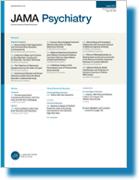Mood disorders risk increased by autoimmunity and infections
 Mood disorders and brain inflammation are strongly associated. Considering that the brain can be a target for autoimmune inflammation and that infections can trigger or worsen autoimmunity, a study recently published in JAMA Psychiatry offering evidence that autoimmune diseases and infections are risk factors for mood disorders may come as no surprise. Noting that...
Mood disorders and brain inflammation are strongly associated. Considering that the brain can be a target for autoimmune inflammation and that infections can trigger or worsen autoimmunity, a study recently published in JAMA Psychiatry offering evidence that autoimmune diseases and infections are risk factors for mood disorders may come as no surprise. Noting that...
"Mood disorders frequently co-occur with medical diseases that involve inflammatory pathophysiologic mechanisms. Immune responses can affect the brain and might increase the risk of mood disorders..."
They designed their study to...
"...estimate the effect of autoimmune diseases and infections on the risk of developing mood disorders."
The authors examined data for 3.56 million people who were born between 1945 and 1996 and followed up 1977 through 2010, 91,637 of whom were seen in hospital for mood disorders. This amounted to 78 million person-years of follow-up. Their main outcome measure was the risk of a first lifetime diagnosis of mood disorder assigned by a psychiatrist in a hospital, outpatient clinic, or emergency department setting. Their data showed significant associations with autoimmune disease and infections:
"A prior hospital contact because of autoimmune disease increased the risk of a subsequent mood disorder diagnosis by 45%. Any history of hospitalization for infection increased the risk of later mood disorders by 62%. The 2 risk factors interacted in synergy and increased the risk of subsequent mood disorders even further [more than doubled]. The number of infections and autoimmune diseases increased the risk of mood disorders in a dose-response relationship."
Medscape Family Medicine in a review of the study states:
"They [the authors] add that recent human and animal research had linked mood disorders to inflammation and that proinflammatory cytokines and brain reactive antibodies can induce changes in neurotransmitter and neuroendocrine function related to psychiatric disorders."
Clinical note: autoimmunity (early antibody activity attacking tissues) and autoimmune disease (full-blown diagnoses with a substantial percentage of tissue already lost to autoimmune inflammation) are pervasive, exceeding cardiovascular diseases and cancers combined. Morever, autoimmune activity is frequently triggered by infection. Practitioners involved in case management of mood disorders must be alert to the brain inflammation/autoimmune dimension.The authors conclude:
"Autoimmune diseases and infections are risk factors for subsequent mood disorder diagnosis. These associations seem compatible with an immunologic hypothesis for the development of mood disorders in subgroups of patients."
